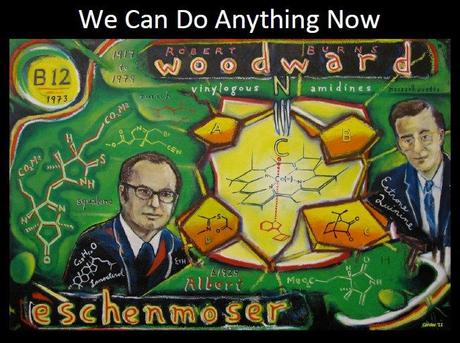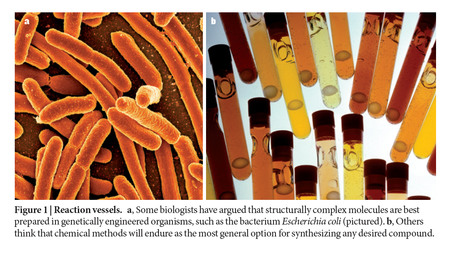
From a series of paintings by David Cordes at Pacific University, Oregon.
I think most would agree that synthetic chemists can now make just about any non-protein/non-polysaccharide natural product if enough time, resources and manpower are brought to bear.[1] But that's not to say that the field is yet mature, or stagnating, as there still remain so many challenges to make our science more efficient, practical, and free from its current over-dependence on rare metals and petrochemical feedstocks. Recently, synthetic biology has started to emerge as a serious alternative to total synthesis when large amounts of complex natural products are required. Just think how many total synthesis papers start with a desultory line about 'the dearth of natural material', before recounting an arduous one- or two-yearlong quest to make a few more milligrams of the compound in question. Perhaps it sometimes makes more sense to try a different approach and ask 'can't we just improve the natural source?'. We synthetic chemists like to think we're special because we have the ability to make new compounds never seen in Nature, but with an increasing understanding of enzymes and the genes that encode for them, organisms can now be coaxed into producing compounds that have never been seen before. If you're interested in reading further debate over the future of the two fields then you should definitely read this short piece in Nature, in which champions of synthetic chemistry Phil Baran and Abraham Mendoza duke it out with Jay D. Keasling, a strong proponent of synthetic biology.

From Nature, 492, 188.
Etc.
1. Of course, there still exists the question of 'should we?'. Aside from the importance of total synthesis in structural determination, and ignoring for the moment the oft quoted reason of solving supply problems, the other main justification offered by the practitioners of the art is the development of new methodology. I'd love to find a way to test this claim, but my feeling is that few generally useful reactions are discovered in long synthetic campaigns. Let me know in the comments if I'm wrong about this.
